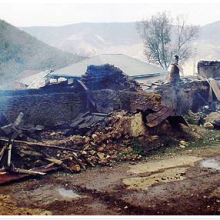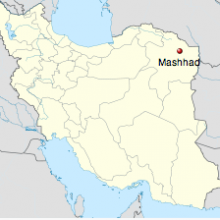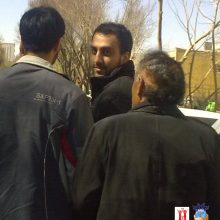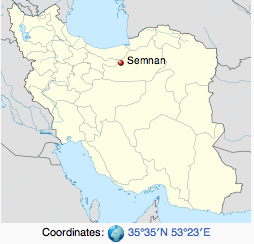Posted: 11 Sep 2010
(9 Sep 2010 – Radio Free Europe) Ferdosieh Nikoumanesh remembers a time when she and her family could live in peace as practicing Baha'is in the Iranian city of Ivel, where more than 50 Baha'i homes were demolished in June. Her childhood home, her grandparents' home, and her grandfather's store were among the many properties burned to the ground. Nikoumanesh and her husband now live in a suburb of Washington, D.C.
Nikoumanesh spent many of her childhood summers in Ivel, northeast of Tehran in Mazandaran Province, visiting her grandparents, who lived in the village until 1983.
She left Ivel when she was a little girl but still holds many memories of living alongside practicing
Muslims. Baha'is have resided in Ivel for more than 160 years and once made up more than half of the population — building schools, a hospital, and stores.
While her family's homes and shop were destroyed this summer, her memories remain alive.
"The best part of the summer was with my grandparents. The feelings I have toward the land [in Ivel] are because of how my grandparents took us there and showed us how to experience its generosity," she said.
She recalled raising livestock, picking flowers in the rich landscape, and having candlelit dinners over storytelling.
The current Iranian government made no apparent efforts to prevent the destruction of the Baha'i homes last June, nor has an investigation been launched into who orchestrated the demolition, despite efforts by the Baha'i community to seek justice.
On August 12, U.S. Secretary of State Hillary Rodham Clinton issued her strongest statement yet in support of the Baha'i community and in opposition to Iran's repression of religious minorities. "The United States is deeply concerned with the Iranian government's continued persecution of Baha'is and other religious minority communities in Iran," Clinton said in a statement. "The United States is committed to defending religious freedom around the world, and we have not forgotten the Baha'i community in Iran."
While the United States may have stepped up its criticism, the people of Ivel have yet to find justice for the loss of their homes.

The home, since destroyed, of the grandparents of Ferdosieh Nikoumanesh. "The best part of the summer was with my grandparents," says Ferdosieh Nikoumanesh.
"Two Baha'i men from Ivel — Faramarz Rohani and Mahmood Piri — sent letters and complained to the courts in Saari, Kia Sar, and Telma Dare. None of them gave the right response," said Nikoumanesh. "They even said since this order was from the higher courts, nothing could be done."
While the international community has spread awareness of the issue and many Muslims in the country oppose the destruction of Baha'i property, the government has done little to respond.
"Recently, there have been many attacks on Baha'i homes, cemeteries dug up, and sites of worship destroyed," said Shastri Purushotma, the human rights representative for the U.S. Baha'i community. "But how can 50 houses be demolished without some prior arrangement to do that level of demolition? We don't have documents showing the government was behind it, but all of these things need planning, heavy equipment, and government support."
Nikoumanesh hopes to one day return to Ivel but knows the dangers she would face if she visited anytime soon. She and many members of the Iranian Baha'i diaspora continue to push for accountability in acts of vandalism toward Baha'is.
"My grandparents have passed, but we children still have faith in being able to return to Ivel and re-experience good moments of our childhood we had there," she says.
She then recited a poem written by Ali Ahmadi on the destruction of homes in Ivel:
"Oh, home, you
are still alive
even if it's not
within your walls
within our hearts you are."
– Ladan Nekoomaram & Sarvazad Katouzian
Source: http://www.rferl.org/content/Bahais_In_Iran_Await_Justice_for_Demolished_Homes_Graves/2153322.html
From Iran Press Watch. Link to this article is here.








.jpg)












